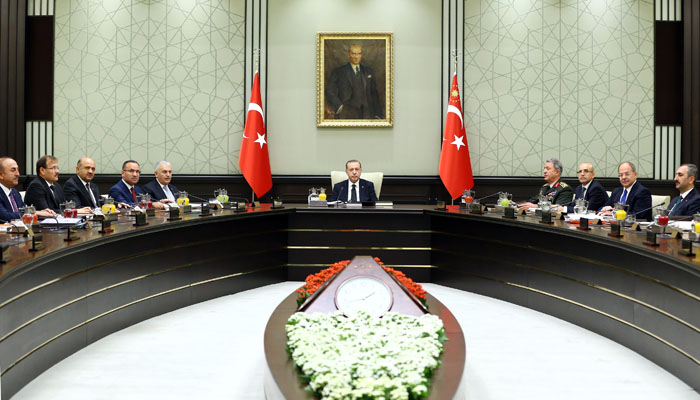Turkey’s National Security Council (MGK), chaired by President Recep Tayyip Erdoğan at the presidential palace in Ankara, has recommended that Turkey close its airspace to the Kurdistan Regional Government (KRG) in northern Iraq and help facilitate the transfer of border control to the central Iraqi government from Kurdish authorities, Cumhuriyet reported on Tuesday.
The MGK has decided to recommend to the Cabinet that that Turkey’s airspace be closed to the KRG and that control of the İbrahim Halil border gate be handed over to Iraq.
The decisions taken by the MGK are recommendatory rather than binding.
The MGK decisions also covered Turkey’s recent involvement in Syria’s Idlib province. “The Turkish Armed Forces have successfully carried out operations in the deconfliction zone of Idlib as a part of the Astana agreement in order to establish permanent peace,” said the council.
The Turkish Foreign Ministry stated on Monday that Turkey is ready to cooperate with the central Iraqi government to end the presence in Kirkuk of the PKK, an outlawed militant organization based in Iraq and carrying out an insurgency since 1984 mainly in predominantly Kurdish eastern Turkey.
Despite warnings from the Baghdad administration and abroad, including from Ankara and Washington, the KRG held a referendum on Sept. 25 for a separate Kurdistan state in northern Iraq.
The results show that over 92 percent of more than 3 million people voted in favor of separation from Baghdad and the formation of an independent Kurdistan state.
“Our only expectation was for them [KRG] to respect our sensitivities and not take a step despite us. They took this step anyway, and they will pay a price,” Erdoğan had said.
He went on to say that the northern Iraqi city of Kirkuk is a controversial area, claiming that Kurds have no place in the history of Kirkuk. Erdoğan threatened the KRG in a speech in the eastern province of Erzurum.
Turkish authorities had conducted direct talks with jailed PKK chief Abdullah Öcalan for several years until a truce in effect collapsed in the summer of 2015.
Since then, there have been heavy clashes between the PKK and Turkish security forces. More than 40,000 people, including 5,500 security force members, have been killed in four decades of fighting between the Turkish state and the PKK, which is listed as a terrorist organization by Turkey, the US and the EU.
